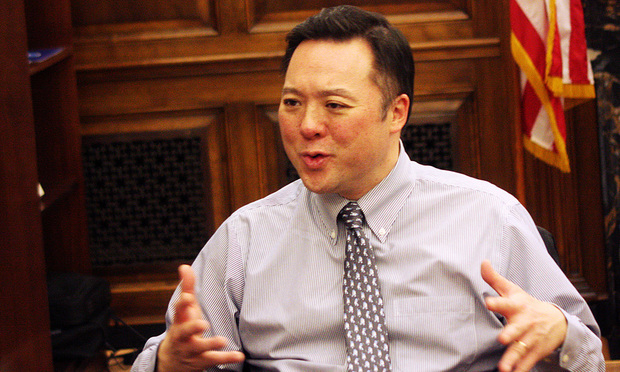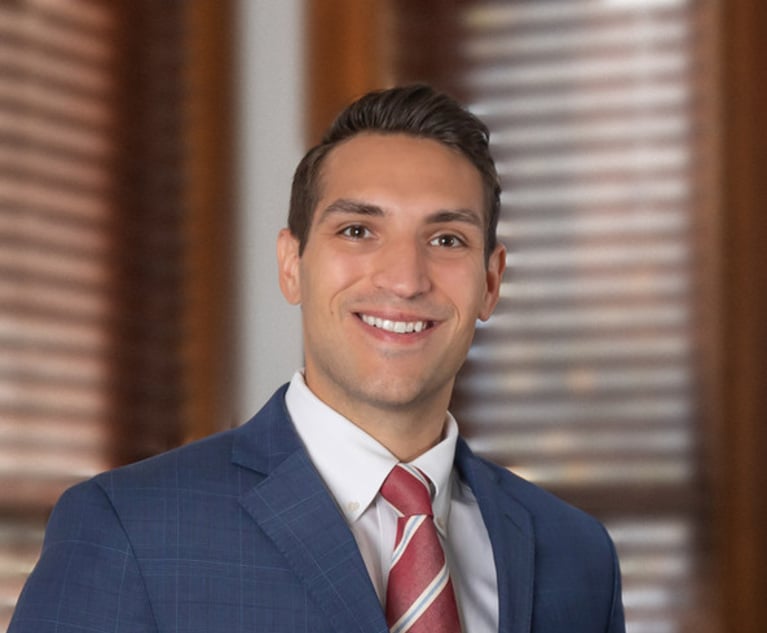'Abusers Die': Emails Allegedly Show Ex-Purdue Pharma Chief Blaming Victims of Opioid Crisis
Connecticut Attorney General William Tong on Tuesday released an unredacted version of the state's lawsuit against Purdue Pharma over the corporation's alleged role in the opioid crisis. That lawsuit includes emails from 2001 by the company's former chairman, who appears appears to criticize opioid addicts.
May 07, 2019 at 12:45 PM
4 minute read
 Connecticut Attorney General William Tong in his Hartford office in February. Photo: Michael Marciano/ALM
Connecticut Attorney General William Tong in his Hartford office in February. Photo: Michael Marciano/ALM
A new unredacted complaint filed Monday by Connecticut's attorney general against Purdue Pharma companies include emails that allegedly show the the corporation's former chairman and president blaming opioid users for the pharmaceutical drug crisis that has swept the country.
Attorney General William Tong's release Tuesday purportedly reveals previously undisclosed “shocking and offensive emails” from Purdue's former chief, Richard Sackler.
Tong claims the emails from 2001 show “callous disregard” for millions of addicts, as Sackler and his family, which owns Stamford, Connecticut-based Purdue Pharma, allegedly sought “to avoid personal liability through hundreds of millions of dollars in fraudulent transfers.” Tong also alleged Sackler's “outrageous comments show an utter disregard for human life.”
Purdue Pharma makes painkiller OxyContin and other drugs that have emerged at the center of a national drug overdose crisis. It doesn't dispute the comments in the emails were from an exchange between Sackler and an acquaintance about 18 years ago. But it said in a statement that the “insensitive language in emails doesn't reflect what Dr. Sackler or Purdue actually did about the emerging problem of opioid abuse.”
“Dr. Sackler has apologized for using insensitive language that doesn't reflect what he actually did. These emails were written two decades ago following news reports about criminal activity involving prescription opioids, such as drug store robberies,” the company statement continues. “Dr. Sackler was expressing his worry that this news coverage would stigmatize an essential FDA-approved medication that doctors feel is critical for treating their patients in pain. The same concern from 20 years ago exists today. The growing abuse of illicit fentanyl and heroin smuggled from China is now interfering with patient access to important legal medication.”
In one email, the acquaintance tells Sackler, “Abusers die. Well that is the choice they made. I doubt a single one didn't know of the risks.”
In response, Sackler says: “Abusers aren't victims; they are the victimizers.”
In the second email with the same acquaintance, Sackler responds to comments the acquaintance made about people unfairly blaming drug manufacturers for the opioid crisis. “Unfortunately, when I'm ambushed by 60 Minutes, I can't easily get this concept across,” Sackler wrote. “Calling drug addicts 'scum of the earth' will guarantee that I become the poster child for liberals who want to do just want (sic) to distribute the blame to someone else, as you say.”
Those comments, Tong said in a press release Tuesday “are far more than a momentary lapse in judgment between friends.”
“They encapsulate the depraved indifference to human suffering that infected Purdue's entire business model,” he said. “Purdue and defendant members of the Sackler family knew people were dying, but they continued to push their opioids in blind pursuit of profit. Purdue and the Sacklers must be held accountable.”
According to Tong's office, parts of the complaint were initially redacted pursuant to an order that a federal judge issued requiring the information be kept confidential unless the producing party agrees the information can be disclosed. Connecticut has since obtained an agreement to release communications that were previously redacted.
Former Attorney General George Jepsen filed the initial lawsuit in December 2018, alleging the company misled doctors and others on the addictiveness of opioids. The initial complaint seeks damages, civil penalties, restitution and permanent injunctive relief. Tong expanded the action, amending the lawsuit to add a fifth count: fraudulent transfer.
The suit, which names 21 individuals and corporate entities, alleges that several Sackler-controlled companies fraudulently transferred hundreds of millions of dollars from Purdue Pharma to the Sacklers to evade liability and accountability related to the opioid epidemic.
Read More:
AG Tong: Purdue Pharma 'Poured Gasoline on the Fire' of Opioid Epidemic
This content has been archived. It is available through our partners, LexisNexis® and Bloomberg Law.
To view this content, please continue to their sites.
Not a Lexis Subscriber?
Subscribe Now
Not a Bloomberg Law Subscriber?
Subscribe Now
NOT FOR REPRINT
© 2025 ALM Global, LLC, All Rights Reserved. Request academic re-use from www.copyright.com. All other uses, submit a request to [email protected]. For more information visit Asset & Logo Licensing.
You Might Like
View All

Apple Disputes 'Efforts to Manufacture' Imaging Sensor Claims Against iPhone 15 Technology
Trending Stories
Who Got The Work
J. Brugh Lower of Gibbons has entered an appearance for industrial equipment supplier Devco Corporation in a pending trademark infringement lawsuit. The suit, accusing the defendant of selling knock-off Graco products, was filed Dec. 18 in New Jersey District Court by Rivkin Radler on behalf of Graco Inc. and Graco Minnesota. The case, assigned to U.S. District Judge Zahid N. Quraishi, is 3:24-cv-11294, Graco Inc. et al v. Devco Corporation.
Who Got The Work
Rebecca Maller-Stein and Kent A. Yalowitz of Arnold & Porter Kaye Scholer have entered their appearances for Hanaco Venture Capital and its executives, Lior Prosor and David Frankel, in a pending securities lawsuit. The action, filed on Dec. 24 in New York Southern District Court by Zell, Aron & Co. on behalf of Goldeneye Advisors, accuses the defendants of negligently and fraudulently managing the plaintiff's $1 million investment. The case, assigned to U.S. District Judge Vernon S. Broderick, is 1:24-cv-09918, Goldeneye Advisors, LLC v. Hanaco Venture Capital, Ltd. et al.
Who Got The Work
Attorneys from A&O Shearman has stepped in as defense counsel for Toronto-Dominion Bank and other defendants in a pending securities class action. The suit, filed Dec. 11 in New York Southern District Court by Bleichmar Fonti & Auld, accuses the defendants of concealing the bank's 'pervasive' deficiencies in regards to its compliance with the Bank Secrecy Act and the quality of its anti-money laundering controls. The case, assigned to U.S. District Judge Arun Subramanian, is 1:24-cv-09445, Gonzalez v. The Toronto-Dominion Bank et al.
Who Got The Work
Crown Castle International, a Pennsylvania company providing shared communications infrastructure, has turned to Luke D. Wolf of Gordon Rees Scully Mansukhani to fend off a pending breach-of-contract lawsuit. The court action, filed Nov. 25 in Michigan Eastern District Court by Hooper Hathaway PC on behalf of The Town Residences LLC, accuses Crown Castle of failing to transfer approximately $30,000 in utility payments from T-Mobile in breach of a roof-top lease and assignment agreement. The case, assigned to U.S. District Judge Susan K. Declercq, is 2:24-cv-13131, The Town Residences LLC v. T-Mobile US, Inc. et al.
Who Got The Work
Wilfred P. Coronato and Daniel M. Schwartz of McCarter & English have stepped in as defense counsel to Electrolux Home Products Inc. in a pending product liability lawsuit. The court action, filed Nov. 26 in New York Eastern District Court by Poulos Lopiccolo PC and Nagel Rice LLP on behalf of David Stern, alleges that the defendant's refrigerators’ drawers and shelving repeatedly break and fall apart within months after purchase. The case, assigned to U.S. District Judge Joan M. Azrack, is 2:24-cv-08204, Stern v. Electrolux Home Products, Inc.
Featured Firms
Law Offices of Gary Martin Hays & Associates, P.C.
(470) 294-1674
Law Offices of Mark E. Salomone
(857) 444-6468
Smith & Hassler
(713) 739-1250












